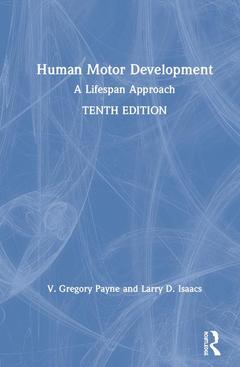Human Motor Development (10th Ed.) A Lifespan Approach
Auteurs : Payne V. Gregory, Isaacs Larry D.

Human Motor Development: A Lifespan Approach, 10th Edition, offers an overview to the study of changes in human movement across the lifespan. The book uses a holistic approach and emphasizes the importance of intellectual, social, and physical development and their impact on human motor development at all ages.
The tenth edition has been completely revised and updated to reflect the most recent research and technology in human motor development. Organized into five parts, the book examines key topics in motor development including the relationship between cognitive and social development and motor development, factors affecting development, changes across the lifespan, and assessment in motor development.
Highly illustrated and written for student accessibility, Human Motor Development: A Lifespan Approach is essential reading for students of motor control and development, kinesiology, human performance, and students interested in physical therapy, physical education, and exercise science. The book also provides access to a fully updated companion website, which includes laboratory exercises, an instructors? manual, a test bank, and lecture slides.
Part I
1. Introduction to Motor Development
2. Cognitive and Motor Development
3. Social and Motor Development
Part II
4. Prenatal Development Factors
5. Effects of Early Stimulation and Deprivation
Part III
6. Growth and Maturation
7. Physiological Changes: Health-Related Physical Fitness
8. Movement and the Changing Senses
Part IV
9. Infant Reflexes and Stereotypies
10. Voluntary Movements of Infancy
11. Fine Motor Development
12. Fundamental Locomotion Skills of Childhood
13. Fundamental Object-Control Skills of Childhood
14. Youth Sports
15. Movement in Adulthood
Part V
16. Assessment
V. Gregory Payne is a Professor Emeritus in the Department of Kinesiology at San Jose State University, USA. He formerly served as the Associate Dean for Research in the College of Applied Sciences and Arts and as Chair of the Department of Kinesiology. Payne is a specialist in human motor development with interests ranging from aging and physical activity to children’s sports and fitness. He received a BS degree from Western Illinois University and later received that institution’s Distinguished Alumni Award. He earned an MA from the University of Iowa and his PED from Indiana University. Payne worked for the Venezuelan Ministry of Education as a Peace Corps Volunteer in Venezuela following college.
As a human motor development researcher and educator, Payne has produced over 170 publications, including numerous refereed articles and 19 editions of five books, and has made nearly 300 presentations throughout the world. He is an elected Fellow of the National Academy of Kinesiology and was a member of the task force that developed the NASPE National Physical Education Standards. The many honors and awards Payne has received include being selected International Professor of the Year at SJSU, receiving the Distinguished Service Award from the California Governor’s Council on Physical Fitness and Sports and the prestigious Research Quarterly for Exercise and Sport Research Writing Award for research involving children’s physical activity and cardiovascular endurance. He has held offices in several organizations including President of NASPE and Chair of the Motor Development Academy. He is an elected Fellow of the National Academy of Kinesiology and the Research Consortium of AAHPERD (SHAPE America), has chaired two editorial boards, and has reviewed for many journals.
Larry D. Isaacs is Professor Emeritus and former Director of the Exercise Physiology Program, Department of Biological Sciences, College of Science and Mathematics
Date de parution : 06-2020
17.8x25.4 cm
Date de parution : 06-2020
17.8x25.4 cm
Thèmes de Human Motor Development :
Mots-clés :
Young Man; Senior Fitness Test; motor development; Brockport Physical Fitness Test; Gregory Payne; Total Gestational Weight Gain; Larry Isaacs; Head Circumference; motor control; Asymmetric Tonic Neck Reflex; cognitive development; Symmetric Tonic Neck Reflex; growth and maturation; Plantar Grasp Reflex; assessing motor development; Standing Long Jump; movement across the lifespan; Short Physical Performance Battery; holistic approach; Tonic Neck Reflex; human motor development; human movement; Gait Speed; social development; Total Body Approach; physical education; Overarm Throw; Object Control Skills; PYFP; Infant Reflexes; Alberta Infant Motor Scale; Youth Sport; Back Saver; Independent Walking; Cardiorespiratory Fitness; Dynamic Visual Acuity; PHV



